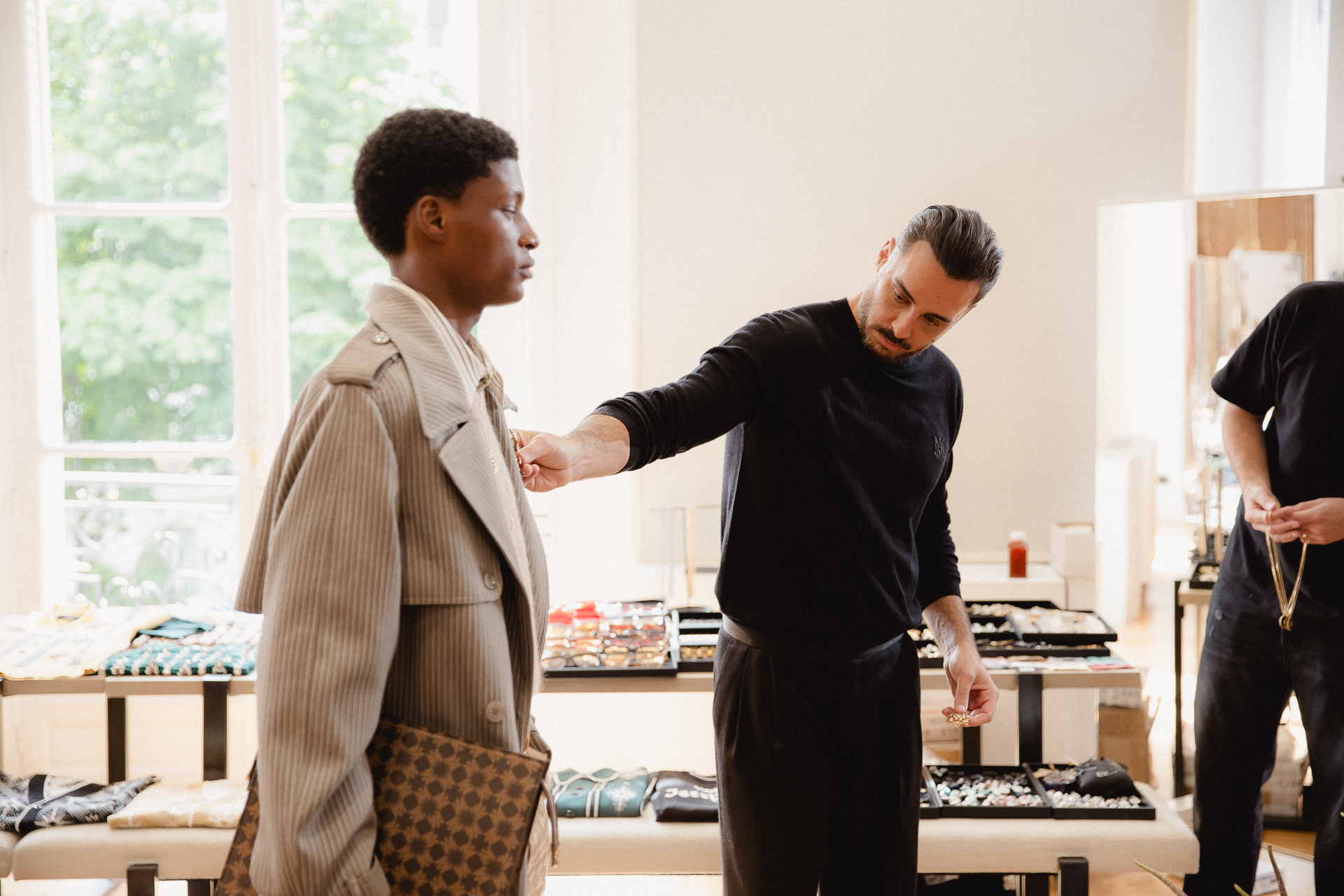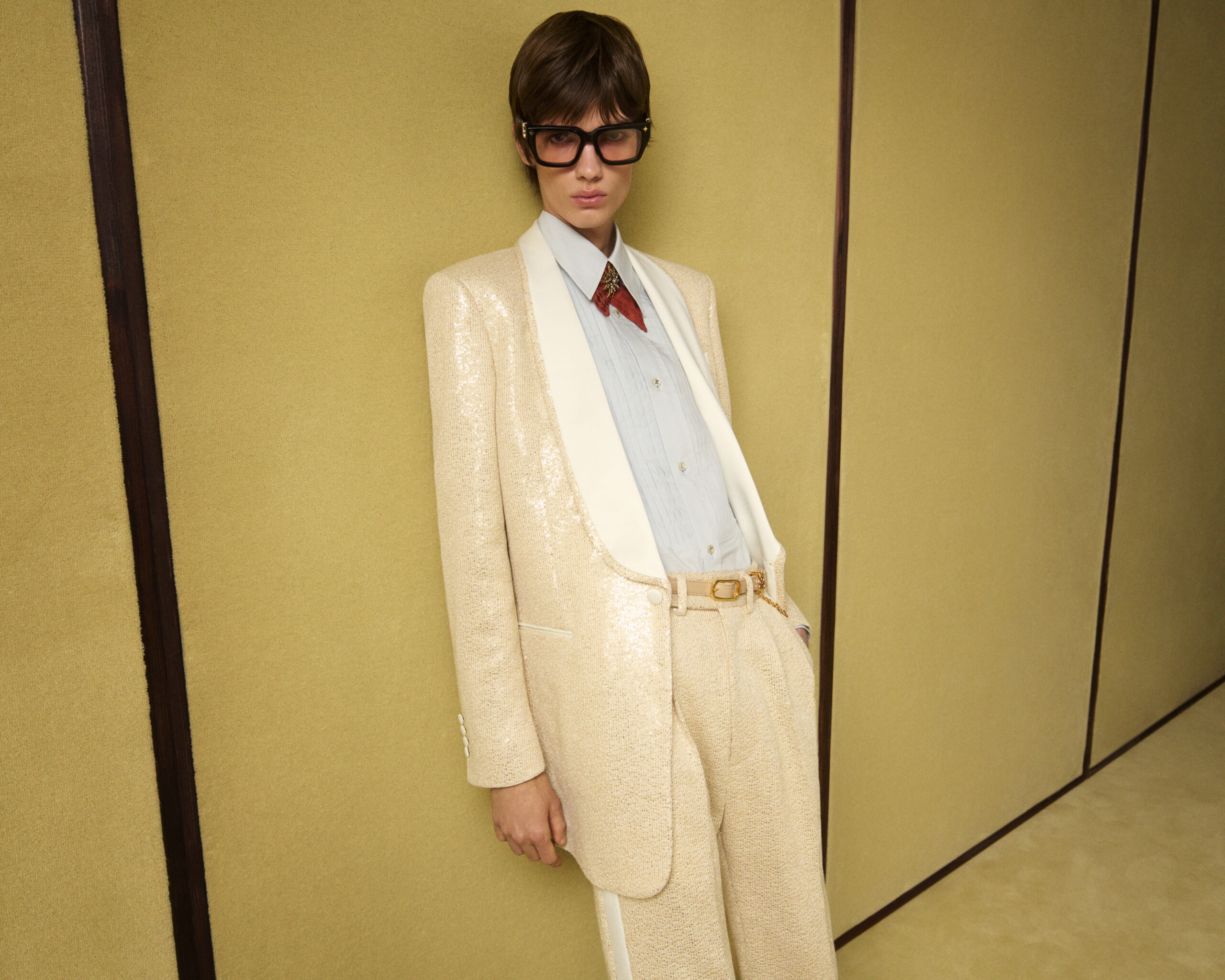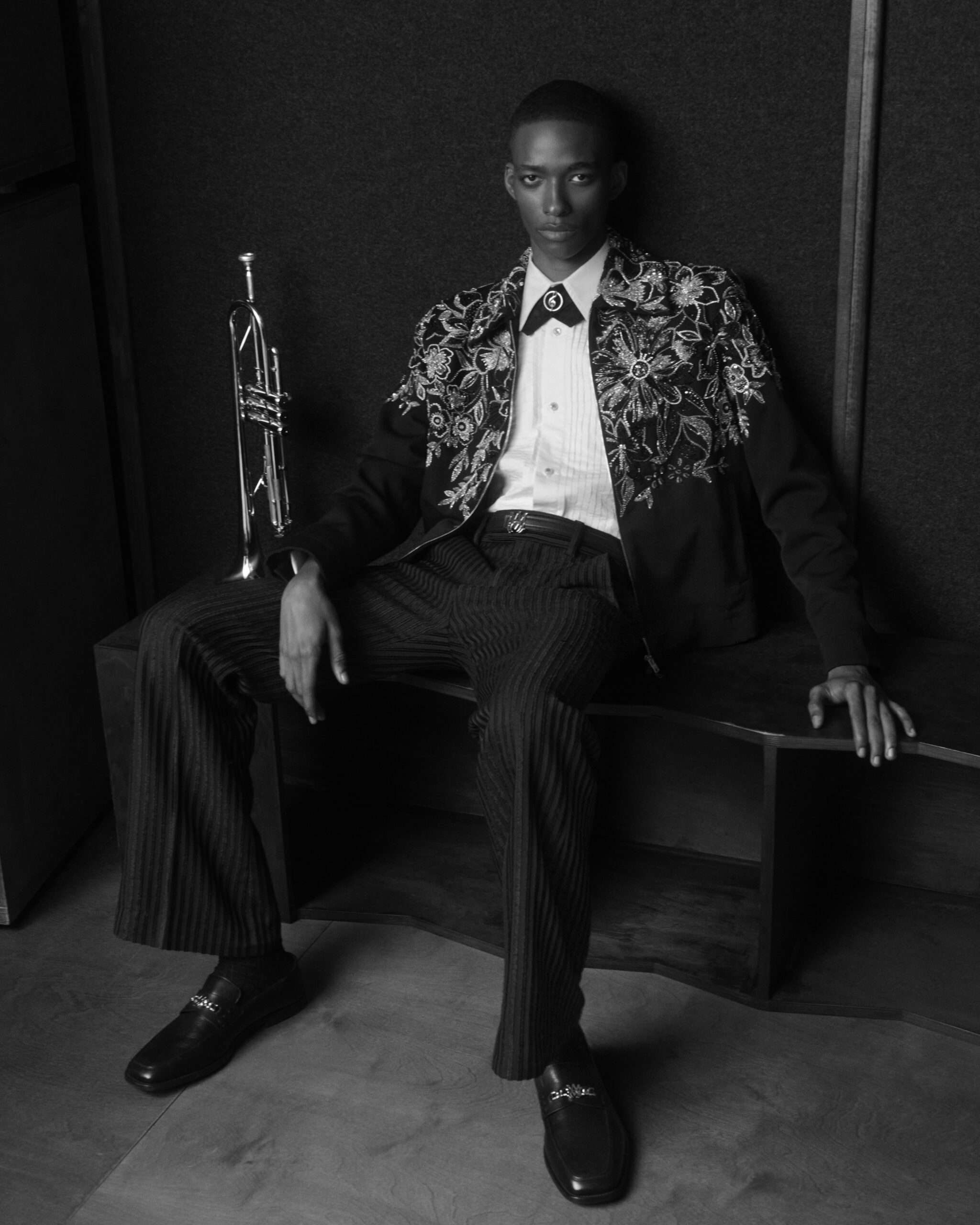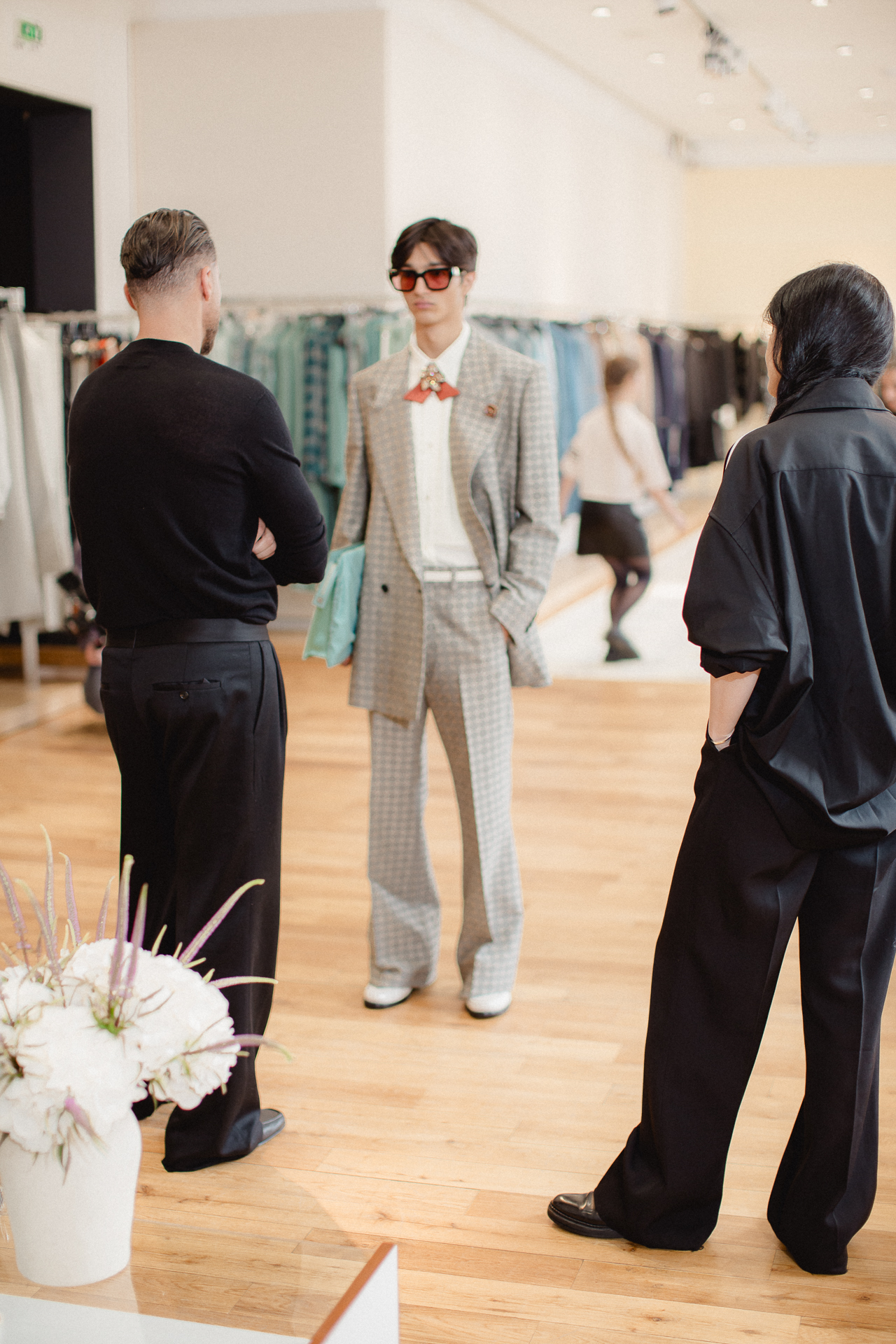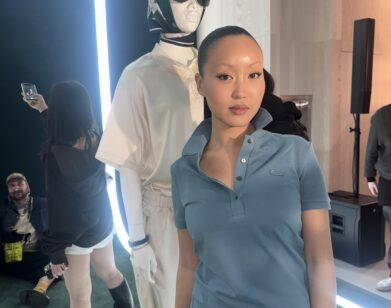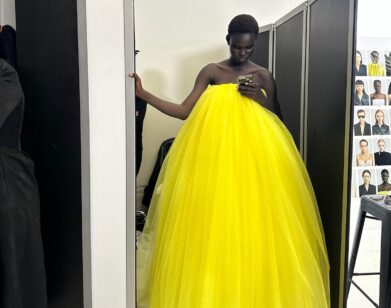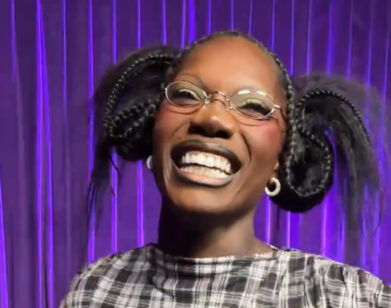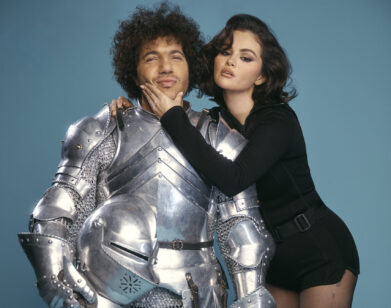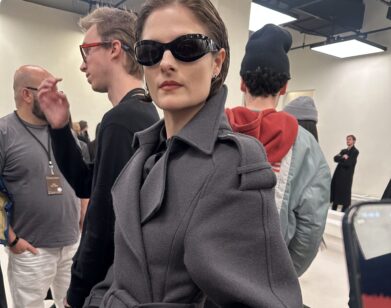DESIGNER
Mike Amiri Tells Mel Ottenberg Why Elvis Stays on His Moodboard
For Mike Amiri, music is the soul of his namesake brand, whether it’s the rockstars on his moodboards or the rappers putting on his clothes. So in his SS25 collection, it was only natural that the 48-year-old designer was inspired by stardom, something the born-and-raised Angeleno knows something about. Retro Hollywood vibes meet Californian irreverence in Amiri’s latest campaign, photographed by Drew Vickers, a marker of the former denim brand’s evolution. In its honor, Amiri called up our editor-in-chief Mel Ottenberg to talk gangster film inspiration and clubbing in slow motion.
———
MIKE AMIRI: Your hair looks good.
MEL OTTENBERG: Thank you.
AMIRI: When the hair’s good and you got some height, it’s good for the video conference.
OTTENBERG: I feel like it’s a little uneven.
AMIRI: No, you’re good.
OTTENBERG: I’m going to fix it for you.
AMIRI: Right there, the volume. We’re both volume guys, so I already know.
OTTENBERG: Your hair looks really good too, Mike.
AMIRI: Little volume for the morning.
OTTENBERG: Are you in Italy right now?
AMIRI: No, I’m in New York, man. I’m rarely here, but every time I come here I wonder why I’m not here more often.
OTTENBERG: Do you still have a house?
AMIRI: I do. I have a house. Fortunately.
OTTENBERG: I’m really glad. I hope that doesn’t sound insensitive, but it’s what I keep asking people.
AMIRI: Usually, people are so timid about it like, “I’m so sorry for your city.” But you’re like, “Do you still have a house?”
OTTENBERG: Yeah. L.A. is my favorite place, but even though I don’t live there—
AMIRI: “Do you have a home?”
OTTENBERG: Yes, exactly. I went out last night and that seemed to work well with the L.A. people, just “do you or don’t you?”
AMIRI: Cut through it.
OTTENBERG: They seem to be good with that. So hey, the show’s over. Tell me about the inspo for your last couple collections. What are you listening to these days when you make these collections? Because they seem so music based.
AMIRI: I don’t know. There’s a lot of Elvis. Danzig does Elvis a little bit, and then there’s some Miles Davis when I want to chill it out a little bit. Things that feel like super American, I guess. I like digging into nostalgic America and things that are optimistic because we have such a global stage now.
OTTENBERG: The world can get really into an American, but they don’t love an American doing Europe or something. They love an American doing America.
AMIRI: And the cool thing is I’m so in between Milan that I could do America with a European execution. The work is received as well as the message, so it’s pretty fun.
OTTENBERG: Wait, what’s your favorite Danzig song? Do you have one?
AMIRI: I’m going to just stick with the last Elvis album because that’s on.
OTTENBERG: Cool. I was just asking because I was looking at my karaoke lists an hour ago. I don’t know why. I was procrastinating.
AMIRI: Which one was it?
OTTENBERG: “Mother” is on my karaoke list. I just think I can embody it and that I’ll crush it.
AMIRI: I feel like that’s a karaoke night for us one time.
OTTENBERG: Yeah, okay.
AMIRI: Don’t forget. It’s happening.
OTTENBERG: I won’t forget.
AMIRI: Going to be a weird one, I promise you.
OTTENBERG: Oh, I love it. I prefer weird. And I also don’t love a private room because if I’m going to bomb, I need to pull the bomb.
AMIRI: Yeah, full humiliation.
OTTENBERG: Yeah, it’s better that way. Mike, let’s talk a little bit about the background. What was the first thing that you were making that made you successful? What did people catch onto?
AMIRI: I think it was very L.A., denim, T-shirt, leather jacket, as simple as it’s going to get. That’s what I had the means to make at the time, being based in Hollywood. You could make great denim in Los Angeles and great T-shirts, and you have a good style background because in L.A., what you wear for lunch is what you wear for dinner. You just switch the jacket, you know? That was first, and it was so approachable that it just took off into a life of its own. From there, I just evolved the messaging a little bit. Once our capabilities evolved to going to Italy and setting up a studio there and going back and forth, I’m like, “Oh, I can make a nice suit.” Then we’re really diving into the craft and understanding what it takes to make a beautiful garment and zeroing on the details. But L.A. is still the center of the soul.
OTTENBERG: Did it work right away when you started making jeans?
AMIRI: Yeah, it became a cultural phenomenon because there wasn’t a lot of the product out there. It was super hard to find. 12 years ago when social media was coming about, you were just discovering things. When people just saw anything new, they gravitated towards it. Proposing some sort of L.A. luxury spin was odd, but it felt novel in its own way, so people jumped on it.
OTTENBERG: Have you left the jeans?
AMIRI: No, denim is still part of our business. It’s not the most massive part anymore. I just saw more of the world and I didn’t want to run just a business for business’ sake. I wanted to tell a story and enjoy the process of creating a world, and sit with all these European brands. I wanted it to expand and evolve. It’s become a highlight of the year for us. Why do this thing if you’re not having fun?
OTTENBERG: Absolutely. Do you make suits for yourselves?
AMIRI: Yeah, for sure. And now that we’re really getting good at red carpet tailoring and proportions, I can really see it.
OTTENBERG: What is the Amiri proportion?
AMIRI: I love a soft shoulder. I like the blazers to be slightly longer. I move between a baggy pant, and a straighter pant, no taper. I love a hard crease. Something that reminds me of a Wrangler Rancher pant that’s super straight. It creates this cool silhouette that almost reminds you of the old crooners or something like that. Makes you look super long as well.
OTTENBERG: Okay, so it’s no longer baggy, it’s narrower. It’s creased.
AMIRI: Exactly.
OTTENBERG: It’s funny you say that because I went to the show and that’s exactly what you did. I found a pair of pants like that in the back of my closet and wore them last night and I felt so good.
AMIRI: What’d you wear them with? Boots?
OTTENBERG: I wore them with boots, yeah.
AMIRI: It’s great, right?
OTTENBERG: I felt great. I was like, “Thank god I’m not wearing denim.” I’m always wearing denim and I get sick of denim too. Did people tell you that you were making a big mistake when you were going to Europe? You had a really valid business and all these rappers are wearing your stuff that’s really making you a real name.
AMIRI: It was mixed. There definitely are people who want you to stay doing what you first come to market with, but the world has broadened a little bit. Just as much as you may lose a couple people by evolving, you gain so many other people and that’s fun. I like people walking by my store and saying, “What is this? Oh, this is Amiri?” That’s what’s exciting to me.
OTTENBERG: When was the first time you saw someone on the street wearing an Amiri T-shirt? Do you remember?
AMIRI: God, I couldn’t tell you, but I could tell you yesterday I was in Bergdorf’s. I’m walking through there and I’m wearing a suit. No tie, just a suit and a T-shirt. And there’s a guy, he’s got to be 70 and he’s in a red Amiri puffer jacket with bones on the side. I was like, “What a flip. Nine years ago I’d be in here in jeans and a T-shirt, and this guy’d be in a suit.” I was like, “Wow, this is kind of working.”
OTTENBERG: When you were younger, were you really into fashion?
AMIRI: I was really into creativity and dream worlds. When I went into clubs, people moved in slow motion to me if they were cool. I liked exaggerating things. Everything was cinematic, so they thought it was severe ADD, which it was to a degree. But you see things in the most interesting light sometimes that might not be how everybody else sees it.
OTTENBERG: 100%. I’m super ADD and it’s totally annoying, but I think it’s also the secret to my success.
AMIRI: Yeah, I wouldn’t change it either.
OTTENBERG: Speaking of cinema, in the last Paris show, I was telling you backstage it went real Scarface in a great way, but it didn’t start there. Can we pinpoint some of the real reference points for the collection?
AMIRI: I mean, there’s totally a bit of a gangster feel that’s a little Ray Liotta, Goodfellas. Beautiful, nostalgic knitwear, collar out on a blazer, complimenting tones and hints of leather, but mixed into the tailoring. I think it’s almost like a high and low without going denim and blazer. It’s your leather jacket and your dress pants, but in a formal way. And you’re probably going to see a little bit of Elvis. I don’t know why he keeps popping up in everything that I do, but there’s always one picture of Elvis on the mood board. I did draw towards movies where you do have a little bit more of a bar culture, whether it’s Goodfellas or Swingers, with beautiful knitwear and cardigans. I love referring to nightlife culture. I guess optimism is the through line through everything.
OTTENBERG: Does it change or is it always the same thing?
AMIRI: It evolves. My north star for American designers has always been the ones that feel iconic. Tom Ford will always look like Tom Ford as it evolves. Rick Owens will always be Rick Owens as it evolves. And I found this sweet spot in the last few collections. If you look at them all together, it’s like the guy is just going different places, which is such a good place for a designer to be because you’re in your world and you’re not really chasing anything and it’s so natural. I have my own codes now that we’re over 10 years into it.
OTTENBERG: And where is he going specifically now? Where would you most want to see him?
AMIRI: I like him out of place sometimes. In this last one, he was in Hollywood in the clubs. I want to take him to Europe and keep that bit of American identity, not in a tourist way but in an authentic way.
OTTENBERG: I dig it. What are you really feeling next for Amiri?
AMIRI: I was excited about women’s wear. I put 10 looks on the runway and so many people sent them back to me like, “More of this.” It was just putting my toe in the water and giving you, “This is her at a cocktail party, this is her in a suit, this is her in a silk bias dress.” I was just giving you just a taste instead of putting a whole women’s collection out. And the response was really encouraging because I found the Amiri girl, and she’s actually the Amiri guy. She might be cooler than him. I don’t think this is his girlfriend. I don’t think that’s empowering. I think that’s her boyfriend, you know? She’s the one with the power.
OTTENBERG: Right.
AMIRI: Instead of making clothes, it’s like you’re designing energy.
OTTENBERG: Sick. How often are you in Europe as opposed to in L.A.?
AMIRI: I go to Europe about eight times a year. I’m just back and forth.
OTTENBERG: You’re just launching your campaign, right?
AMIRI: Yes, for Spring-Summer 2025. It has a little bit of that old school feel. We had Drew Vickers shoot it. I wanted it to feel like something from the late ’50s, or it could have been now, connecting them in a way. So some are black and white, some are in color. They feel nostalgic, but they feel modern.
OTTENBERG: Okay. What neighborhood in L.A. is the most Amiri?
AMIRI: I think at the moment it’s Hollywood. It’s where I grew up and there’s so many little pockets there and you could find your thing. You could find your place there.
OTTENBERG: What restaurant from now or the past would you most want to see the Amiri runway look in L.A.?
AMIRI: Sunset Tower, piano room.
OTTENBERG: Yeah.
AMIRI: It’s just so dark and cool. Everybody looks great in there. The lighting is so dark. I’m like, “Why does everybody look so good?”
OTTENBERG: I’ve had good times there. I haven’t been in a second, but my friend was there last week and said it was a really intense, heavy crowd, which was good.
AMIRI: You revert to things that feel classic. All these private member clubs are opening up left and right, and still the coolest place in the world is the Sunset Tower.
OTTENBERG: I love it. I’ll see you at the Sunset Tower, karaoke afterwards.
AMIRI: Let’s do it. This is going to happen.

